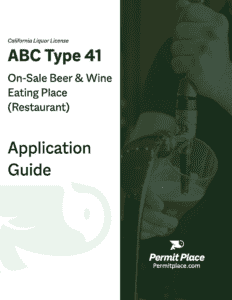Five Questions To Ask Before Applying For A California Liquor License
If you own a café or restaurant and are seeking a California Liquor License and do not serve alcohol, you may be missing out on a very profitable component of your business. We’ve compiled a list of the five top questions that we suggest you ask before you get started on the California Liquor License process. If you’re looking for a California liquor license and have additional questions, let us know!
California Restaurants Looking for a Beer & Wine Liquor License…
Get step-by-step instructions on how to complete the ABC Type 41 On-Sale Beer and Wine Eating Place Liquor License. Once done, you’ll have a complete, ready to submit ABC Type 41 application.
1. What Type of Liquor License Aligns with My Business Model?
California offers various liquor licenses tailored to different business operations, such as restaurants, bars, and hotels. Selecting the appropriate license type is crucial, as each has specific privileges and restrictions. For instance, a Type 41 license permits the sale of beer and wine for on-site consumption in bona fide eating places, while a Type 47 license allows the sale of beer, wine, and distilled spirits.
2. Does My Business Location Comply with Local Zoning Laws?
Ensure your chosen location adheres to local zoning regulations and is suitable for alcohol sales. Some areas may have restrictions based on proximity to schools, churches, or residential zones. Consult with local planning departments to verify compliance and determine if a Conditional Use Permit (CUP) is required.
3. What Are the Financial Implications of Obtaining and Maintaining the License?
The application process involves various fees, including application fees, annual renewal fees, and potential costs for public notifications or required inspections. For example, application fees for general licenses can range from $945 to $16,560, depending on the license type. Budgeting for these expenses in advance is essential to avoid financial strain during the application process.
4. Do I Have All Necessary Documentation and Meet Eligibility Criteria?
Compile all required documents, such as proof of ownership or lease agreements, financial statements, and personal identification. Accurate and complete documentation is vital, as discrepancies can lead to delays or denial of your application. Additionally, be prepared for background checks, which may include fingerprinting and a review of your financial history.
5. Am I Prepared to Engage with the Community and Address Potential Protests?
The application process includes a public notification period, during which community members can support or protest your application. Engaging proactively with the local community, addressing concerns, and demonstrating how your business will positively impact the area can help mitigate potential objections. Being prepared to respond to protests is crucial, as unresolved issues can significantly delay the licensing process.
By thoroughly addressing these considerations, you can navigate the California liquor license application process more effectively, increasing the likelihood of a successful outcome.

